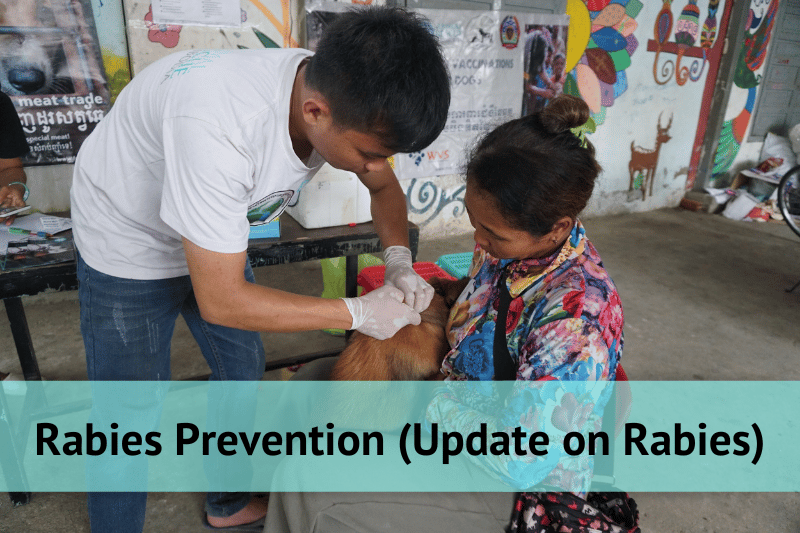ចុចត្រង់នេះដើម្បីអានអត្ថបទជាភាសាខ្មែរ។.
In ARC’s article on What is Rabies & How to Treat it, you have already learned that rabies is still a big deal in the Kingdom and Southeast Asia in general. But how exactly can this deadly disease be eliminated once and for all, and who are the main actors for change?
In this article, Animal Rescue Cambodia will answer the key questions around rabies, and most importantly, what YOU can do for yourself and your pet dogs to prevent getting this viral disease.
- How to Prevent Rabies?
- Rabies in Humans
- Rabies in Dogs and Cats
- Interacting with Stray/Wild Animals
- What to do after a Dog Bite?
- Which Organizations are Fighting Rabies?
- How YOU can Contribute to Rabies Elimination in Cambodia
Without further ado, here is all the information you need.
1. How to Prevent Rabies?
Preventing rabies is actually easy. There is a vaccination for humans and animals.
Humans can get a rabies vaccination both as a preventative measure and as an emergency treatment after a (potential) infection, the so-called post-exposure prophylaxis (PEP).
However dogs that were exposed to rabies and get the vaccination only after an infection, sadly, cannot be cured.
2. Rabies & Humans
If you live in Cambodia, a developing country, leading global healthcare institutes highly recommend rabies vaccinations for yourself and your family (children 2 years and up).
Whereas a rabies vaccination for cats and dogs fully prevents the disease, pre-exposure vaccinations for humans only slow down the rabies infection and always require post-exposure injections after an animal bite.
Since in developing countries like Cambodia, access to medical care can be difficult, especially in rural areas, the additional time a pre-exposure rabies vaccination provides, can make the difference between life and death.
How Rabies Immunization Works
The immunity to rabies depends on having enough antibodies in your blood so that your body can recognize the virus and be able to fight it. Those antibodies are the security guards in your body, so to speak. If you don’t have enough antibodies, your immune system may not be able to kill the virus before it replicates.
The pre-exposure vaccinations are your first wave of security guards. But over time, they retire. This means you have less and less of them. So, if you get infected and only have a low amount of antibodies, your body may not be able to fight a rabies infection.
Now, because rabies is 100% deadly and it is unknown at the time of a bite or contact with a potentially sick animal, how many antibodies you have, the doctor will give you a rabies booster injection right away to make sure that the virus gets killed before it reaches the brain.
You may think this is an over-vaccination and may not be necessary, but with a disease as fatal as rabies it’s not worth the risk.
Pre-exposure rabies vaccinations
According to the WHO (World Health Organization) and the Pasteur Institute in Phnom Penh, people who have never been vaccinated against rabies need 4-5 doses of rabies vaccines. Afterward, a vaccine booster is recommended every 3-10 years, depending on the previous doses given and risk exposure.
In Phnom Penh, you can get your rabies vaccine at the Pasteur Institute in Phnom Penh (Monivong Boulevard) and the National Institute for Public Health (Tuol Kork) as well as some private clinics.
In fact, the Institut Pasteur vaccinates around 21,000 people against rabies every year. The total cost for all 3 injections (day 0, day 7, day 21) is currently 102 USD.
Post-exposure rabies vaccinations
If you were bitten by an animal or have been in contact with an animal (scratch, lick, etc.) that you suspect may have rabies, visit a knowledgeable doctor or clinic immediately! Even if you had the pre-exposure rabies vaccinations. In Phnom Penh, InstitutePasteur is experienced with rabies: Location Monivong Blvd./Street 84, Phone +855 12 812 003.
The post-exposure prophylaxis (PEP), if you didn’t have any pre-exposure rabies vaccinations, requires 4-5 injections (day 0, day 3, day 7, day 21) and currently costs 34 USD per injection. If you had pre-exposure vaccinations, those normally count against the required post-exposure prophylaxis, depending on when you had your last injection or booster.
3. Rabies in Dogs and Cats
Responsible pet ownership includes providing shelter, healthy food and water, medical care, exercise, and mental stimulation as well as companionship for the duration of your pet’s life!
In terms of medical care, make sure that your pet dog is up-to-date with his/her rabies vaccines. This is also important in case you plan to relocate with your pet from Cambodia!
The first rabies vaccine can be given from the age of 3 months and up. After that, a rabies booster should be given every 1-3 years, depending on the vaccine brand.
In addition, vaccinating puppies decreases the risk of spreading rabies within a community.
Therefore, desexing is a humane way to control animal overpopulation, and spaying/neutering your pet also has many health benefits for your beloved furry friend! The cost of spaying/neutering varies, depending on the animal and the veterinary clinic.
Generally, the cost of desexing a cat/dog is around 100-250 USD at private clinics. Some organizations like Animal Rescue Cambodia are able to offer discounted or free desexing for pets of members of disadvantaged groups when projects are available.
Although cats can get rabies, it occurs less frequently compared to dogs. When cats get rabies, it is typically the kind of rabies where the animals get apathetic and are less likely to bite. Yet, rabies vaccinations for cats are recommended, especially if you live in a developing country like Cambodia with more stray animals and less overall hygiene and medical services.
4. Interacting with Stray/Wild Animals
While compassion, kindness, and empathy are core traits of a strong society, staying safe while helping others is important.
If you see a stray cat or dog in distress, you may want to help him or her. And that’s great. Just keep in mind to do so safely.
In case the stray animal is not in danger or hurt, you may consider leaving him/her alone. The same goes for kittens or puppies who may seem abandoned. It’s likely that their mom is nearby, just looking for food or defending the territory. Observe from a far distance for a longer period of time. If the mother is around, she may be afraid to return to her offspring if you are waiting nearby.
In case the animal is obviously in danger or hurt, please help them! Keep in mind that stray animals are often frightened by humans, and therefore can react aggressively. Carefully approach the animal, ideally wrap him/her in a blanket, and take him/her to the vet.
5. What to do after a Dog Bite?
Do you think a dog may have rabies? Do this:
- If you think a dog may have rabies, stay away from the dog and do not approach!
- Call/message the IBCM hotline +855 (0)10 804 176 (English, Khmer), and our knowledgeable staff will advise you on how to proceed!
Signs of rabies include: salivating heavily, biting everything, and acting strangely.
If you were bitten by an animal or have been in contact with an animal (scratch, lick, etc.) that you suspect may have rabies, visit a knowledgeable doctor or clinic immediately! Even if you had the pre-exposure rabies vaccinations. In Phnom Penh, InstitutePasteur is experienced with rabies: Location Monivong Blvd./Street 84, Phone +855 12 812 003.
If you get bitten by a dog that does not display any rabies symptoms, contact the ARC-IBCM team to inquire whether an immediate vaccination is necessary: +855 (0)81 80 41 76 (English, Khmer)
6. Which Organizations are Fighting Rabies?
Rabies is a major public health problem in Cambodia. The early warning system for early detection and response does not yet work properly. So, the demand for action is urgent!
On a global level, the World Health Organization aims to achieve zero human rabies deaths worldwide by 2030.
In Asia, the Association of Southeast Asian Nations (ASEAN) is working on eliminating rabies and Cambodia aims to be rabies-free by 2030. This is crucial to the global elimination of this deadly disease as 95% of all rabies deaths worldwide occur in Africa and Asia.
ASEAN’s strategies include large-scale stray canine vaccination missions (covering at least 70% of the dog population), humane dog population management programs, as well as the promotion of responsible pet ownership (which includes vaccinations).
At the same time, further research as well as awareness and behavior change among the general public together with rabies vaccinations for humans (including access to quality pharmaceuticals), both aim at saving human lives and eliminating rabies in Asia!
In Cambodia, Animal Rescue Cambodia is collaborating with Mission Rabies, the Phnom Penh Animal Welfare Society (PPAWS), the General Directorate of Animal Health and Production (GDAHP) of the Ministry of Agriculture, the Ministry of Education, and other partners to eliminate rabies.
Over the last six years, ARC administered more than 15,300 rabies/core vaccinations to disadvantaged cats and dogs in Cambodia.
7. How YOU can Contribute to Rabies Elimination in Cambodia
There are eight straightforward actions you can take to prevent rabies for your human and pet family and to contribute to rabies elimination in Cambodia.
- Get rabies vaccinations for yourself and your family
- Vaccinate your pet dog against rabies
- Spay/neuter your pets
- Be careful when interacting with stray animals
- Leave wild animals in the wild – eagles, bears, tigers & co. are neither pets nor food
- Share this information with your friends, family, and social network
- Support your local animal welfare organization
Next Steps
Do you have any comments or questions?

